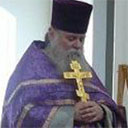O Christ. O great and most holy Pascha! . . . Grant that we may more perfectly partake of Thee in the never-ending day of my Kingdom!
One of the most meaningful periods in the Church calendar is Bright Week, the week following Pascha. Unfortunately this celebration seems sometimes to be eclipsed by the grief and exultation of Holy Week and Pascha. The fatigue, both physical and emotional, generated by the observances just preceding leads most parishes to curtail Bright Week services; those which are held are often poorly attended.
Bright Week should not be so neglected. It continues our celebration of our Lord’s Resurrection and thereby deepens our appreciation of the Feast and our understanding of the events commemorated.
One of the most interesting aspects of the Bright Week services is the source of the hymns. Almost all the hymns for Vespers, Matins, and the Liturgies come from the Sunday services of the year. This reminds us that each Sunday throughout the year is a small Pascha, a weekly celebration of the Resurrection. This, in turn, underscores the centrality for the Christian of the Savior’s rising. Everything we are as Christians springs from Christ’s conquest of death; the hopes of all mankind strode forth with Him from His tomb. That humble cave, hollowed in cold stone, witnessed the renewal of all mankind. We may call it “the empty tomb”, because the absence from it of the Savior’s Body was the apostles’ first evidence of the Resurrection. But indeed, it was not empty, for the myrrh-bearers and the apostles found in it and carried away the message of the rising of the incarnate God, the good news of mankind’s salvation. As the Apostle says, “If Christ has not been raised, your faith is futile and you are still in your sins . . . . But in fact Christ has been raised from the dead, the first fruits of those who have fallen asleep” (I Corinthians 15: 17, 20).
We owe our identity as Christians to our participation through baptism in Christ’s death and Resurrection. We sustain ourselves by receiving His crucified and risen Body and Blood. We live by the grace of His Spirit, which He sent into the world after His rising, to unite us to Him and to fill us with His resurrection life.
The use of Sunday hymns throughout Bright Week indicates that for that week, there are no “weekdays”: Every day is a Sunday. In other words Bright Week is not a week, a series of seven days, but only one day – a seven-day day.
The schedule of Bright Week mirrors one of the hymns
of Pascha, in which we implore of Christ the closer communion with Him of “the
never-ending day of Thy Kingdom.” We see here part of the lesson that Bright
Week has for us. The hymn we quoted is also read by the priest as the Gifts are
removed from the holy table just after Holy Communion. Moments before we have
received the Body and Blood of our Savior. Yet, with the taste of the blessed
Mysteries still in our mouth, we entreat the Lord for an even more intimate
union with Him. The Psalm invites us to “taste and see that the Lord is good”
(34:8), but every morsel of His fellowship that we experience here is only a
hint of the sumptuous banquet of love and grace that awaits us in the age to
come.
We celebrate Pascha, our Lord’s Resurrection, because of the even greater glory which He died and rose to bestow on us, the joy without limit of the Kingdom. Everything in this world, even every good thing, is unsubstantial, a weak reflection of anticipated blessings. Saint Symeon Metaphrastes writes, “This month will clothe the naked trees with the glory previously hidden within them. And so, too, will the bodies of the righteous be glorified through the ineffable light – the power of the Spirit – that is already present within them . . . . The glory that in the present life enriches the souls of the saints will cover and enfold their naked bodies at the resurrection and will carry them to heaven. Then with body and soul the saints will rest with God in the kingdom forever . . . . [Christ] will envelop their bodies with the divine glory that, through their good works and the Spirit, their souls had already received in the present life. Thus glorified by the divine light and caught up into the heavens to meet the Lord, they will always be with Him.”
Truly Christ showers upon us abundant spiritual and material benefits in this world: the joy of life and health, the gift of communion with Him in prayer, His words of instruction and consolation preserved in the Holy Scriptures, the grace of His Spirit to cleanse and strengthen us in our trials, His powerful presence in the Holy Mysteries. Yet all of this is only a pale reflection of the communion He promises us in the future age.
***


